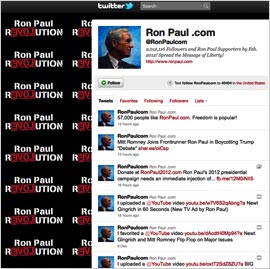 Even within the rough-and-tumble arena of national politics, Twitter has emerged as an especially brusque form of expression. A report by the Pew
Research Center’s Project for Excellence in Journalism concludes that campaign-related discourse on Twitter tends to be more opinionated
and often more negative about candidates than on blogs and in the news.
Even within the rough-and-tumble arena of national politics, Twitter has emerged as an especially brusque form of expression. A report by the Pew
Research Center’s Project for Excellence in Journalism concludes that campaign-related discourse on Twitter tends to be more opinionated
and often more negative about candidates than on blogs and in the news.
Focusing on the 2012 presidential election, the study found that negative comments on Twitter outstripped positive ones
for six of the eight candidates between May 2 and Nov. 27. That trend was reflected most dramatically in the run-up to Herman Cain’s Dec. 3 decision to suspend his campaign.
The
discussion about Cain on Twitter turned more negative than positive starting in mid-October and continuing over subsequent weeks in connection with reports of sexual harassment allegations, his
stumble on a Libya question and his drop in the polls.
advertisement
advertisement
Cain has also been the most heavily covered candidate overall in the last seven weeks, given the allegations of a longstanding affair
with an Atlanta businesswoman prior to his dropping out of the race.
If the election were decided on Twitter, Texas Congressman and Internet favorite Ron Paul would likely be the winner. More
than half (55%) of the assertions about Paul on Twitter have been supportive, while only 15% have been negative. The Pew report described Paul, who has received less coverage in news outlets than
every other GOP candidate except Rick Santorum, as “something of a social media phenomenon.”
On the other side, negative tweets about President Obama have outrun positive ones by a
3-1 margin. “Yet unlike in news coverage, overall on Twitter (and blogs), other candidates have received harsher treatment than the president,” noted the study.
The biggest Twitter
shift lately has been for Newt Gingrich, who has moved from negative to positive territory on the microblogging service in recent weeks after 25 straight weeks of mostly negative discussion about the
former House Speaker. The volume of tweets focusing on Gingrich also shot up in November -- from about 15,000 to more than 80,000 messages a week -- as he gained traction in the polls.
Gingrich’s news coverage has also changed from very heavily negative to only modestly so. For the full seven months studied, he has had the most unflattering narrative in mainstream news of
any GOP contender, at 33% negative.
The Pew study noted that its research on tone in news coverage does not refer to media fairness or bias. Rather, it is intended to be a comprehensive
analysis of whether messages Americans receive about candidates in the news media are positive, negative or neutral.